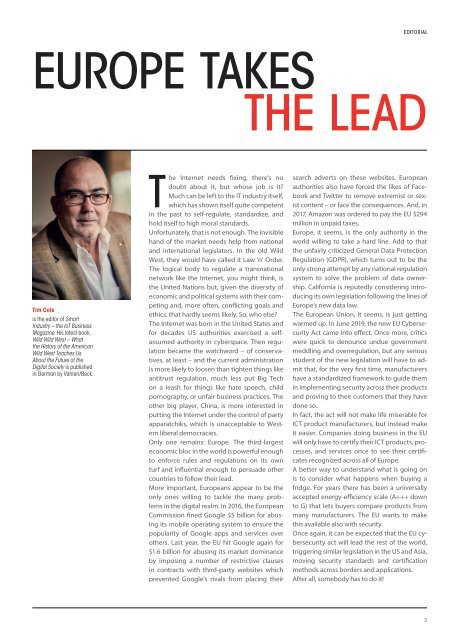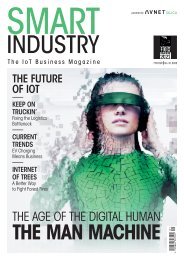Smart Industry 1/2020
Smart Industry 1/2020 - The IoT Business Magazine - powered by Avnet Silica
Smart Industry 1/2020 - The IoT Business Magazine - powered by Avnet Silica
- No tags were found...
Create successful ePaper yourself
Turn your PDF publications into a flip-book with our unique Google optimized e-Paper software.
Editorial<br />
Europe Takes<br />
the Lead<br />
Tim Cole<br />
is the editor of <strong>Smart</strong><br />
<strong>Industry</strong> – the IoT Business<br />
Magazine. His latest book,<br />
Wild Wild West – What<br />
the History of the American<br />
Wild West Teaches Us<br />
About the Future of the<br />
Digital Society is published<br />
in German by Vahlen/Beck.<br />
The Internet needs fixing, there’s no<br />
doubt about it, but whose job is it?<br />
Much can be left to the IT industry itself,<br />
which has shown itself quite competent<br />
in the past to self-regulate, standardize, and<br />
hold itself to high moral standards.<br />
Unfortunately, that is not enough. The invisible<br />
hand of the market needs help from national<br />
and international legislators. In the old Wild<br />
West, they would have called it Law ‘n’ Order.<br />
The logical body to regulate a transnational<br />
network like the Internet, you might think, is<br />
the United Nations but, given the diversity of<br />
economic and political systems with their competing<br />
and, more often, conflicting goals and<br />
ethics, that hardly seems likely. So, who else?<br />
The Internet was born in the United States and<br />
for decades US authorities exercised a selfassumed<br />
authority in cyberspace. Then regulation<br />
became the watchword – of conservatives,<br />
at least – and the current administration<br />
is more likely to loosen than tighten things like<br />
antitrust regulation, much less put Big Tech<br />
on a leash for things like hate speech, child<br />
pornography, or unfair business practices. The<br />
other big player, China, is more interested in<br />
putting the Internet under the control of party<br />
apparatchiks, which is unacceptable to Western<br />
liberal democracies.<br />
Only one remains: Europe. The third-largest<br />
economic bloc in the world is powerful enough<br />
to enforce rules and regulations on its own<br />
turf and influential enough to persuade other<br />
countries to follow their lead.<br />
More important, Europeans appear to be the<br />
only ones willing to tackle the many problems<br />
in the digital realm. In 2016, the European<br />
Commission fined Google $5 billion for abusing<br />
its mobile operating system to ensure the<br />
popularity of Google apps and services over<br />
others. Last year, the EU hit Google again for<br />
$1.6 billion for abusing its market dominance<br />
by imposing a number of restrictive clauses<br />
in contracts with third-party websites which<br />
prevented Google’s rivals from placing their<br />
search adverts on these websites. European<br />
authorities also have forced the likes of Facebook<br />
and Twitter to remove extremist or sexist<br />
content – or face the consequences. And, in<br />
2017, Amazon was ordered to pay the EU $294<br />
million in unpaid taxes.<br />
Europe, it seems, is the only authority in the<br />
world willing to take a hard line. Add to that<br />
the unfairly criticized General Data Protection<br />
Regulation (GDPR), which turns out to be the<br />
only strong attempt by any national regulation<br />
system to solve the problem of data ownership.<br />
California is reputedly considering introducing<br />
its own legislation following the lines of<br />
Europe’s new data law.<br />
The European Union, it seems, is just getting<br />
warmed up. In June 2019, the new EU Cybersecurity<br />
Act came into effect. Once more, critics<br />
were quick to denounce undue government<br />
meddling and overregulation, but any serious<br />
student of the new legislation will have to admit<br />
that, for the very first time, manufacturers<br />
have a standardized framework to guide them<br />
in implementing security across their products<br />
and proving to their customers that they have<br />
done so.<br />
In fact, the act will not make life miserable for<br />
ICT product manufacturers, but instead make<br />
it easier. Companies doing business in the EU<br />
will only have to certify their ICT products, processes,<br />
and services once to see their certificates<br />
recognized across all of Europe.<br />
A better way to understand what is going on<br />
is to consider what happens when buying a<br />
fridge. For years there has been a universally<br />
accepted energy-efficiency scale (A+++ down<br />
to G) that lets buyers compare products from<br />
many manufacturers. The EU wants to make<br />
this available also with security.<br />
Once again, it can be expected that the EU cybersecurity<br />
act will lead the rest of the world,<br />
triggering similar legislation in the US and Asia,<br />
moving security standards and certification<br />
methods across borders and applications.<br />
After all, somebody has to do it!<br />
3
















